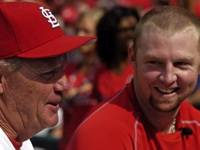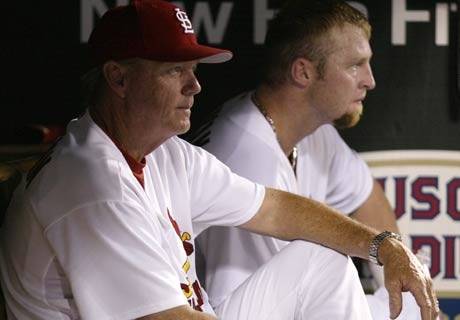 For those who live in the public eye, criticism is a naturally-occurring phenomenon. Some people regard it as a tool of immeasurable importance used to maintain perspective and integrity. Others see it as an unnecessary hindrance that is too often spiked with malice. In and around St. Louis, criticism has become the focal point of a burgeoning controversy.
For those who live in the public eye, criticism is a naturally-occurring phenomenon. Some people regard it as a tool of immeasurable importance used to maintain perspective and integrity. Others see it as an unnecessary hindrance that is too often spiked with malice. In and around St. Louis, criticism has become the focal point of a burgeoning controversy.
Throughout the summer, observers of Cardinals baseball have followed with great interest the continuing saga of Dave and Chris Duncan. Dave Duncan is currently in his 14th season as the Redbirds’ pitching coach, and the work he has done in that capacity has garnered him industry-wide acclaim. During his 30 years as a big league instructor, many a Dave Duncan restoration project has yielded a level of success that can be directly attributed to his tutelage.
Now, Duncan views with uncertainty his future in St. Louis. He remains bitter over the alleged mistreatment of his son, Chris, a once dangerous power hitter and frequently horrendous defensive outfielder who spent four years as a Cardinal. Dave Duncan believes it was the arrows slung by Chris Duncan’s detractors that put the club, which ultimately dealt Chris to Boston on July 22 (he has since been released by the Red Sox), into an impossible position. Even with St. Louis poised to run away with the National League Central Division crown, the Duncan situation has nevertheless loomed as a significant distraction.
Cardinals manager Tony La Russa and the elder Duncan have long fostered reputations as men of fierce loyalty, both to each other and to members of the close-knit baseball circle in which they’ve operated. Thus, it was not surprising when the Cardinals spent a first-round draft pick on then-18-year-old Chris ten years ago. (One of the pair’s former employers, the Oakland Athletics, closely monitored the high school and collegiate career of Cody McKay, son of longtime La Russa first-base coach Dave McKay, before drafting him in 1996; the young McKay ultimately ended his brief major league career in St. Louis in 2004.) Yes, Chris Duncan was a prospect, a strapping 6′ 5″ specimen with a sweet left-handed swing. But in baseball, there is no sure thing, and he toiled in the minors for seven years before seeing action in the Big Show. Yes, he displayed regular bursts of power at the plate, homering once every 15 at-bats during his first two full seasons with the Cardinals. But he was a defensive liability, the kind of fielder who could perhaps be hidden at first base on a team that didn’t already include the great Albert Pujols. Or, the kind of fielder who could permanently toss away his glove upon being moved to the American League.
 Mired in a continuous slump, and between stints on the disabled list with a variety of injuries throughout 2008 and 2009, Chris incurred the wrath of an increasing number of impatient fans and the attention of questioning columnists, which finally prompted La Russa to lash out on July 21.
Mired in a continuous slump, and between stints on the disabled list with a variety of injuries throughout 2008 and 2009, Chris incurred the wrath of an increasing number of impatient fans and the attention of questioning columnists, which finally prompted La Russa to lash out on July 21.
“I get so tired of the unfair treatment of Chris Duncan,” he said. “It makes me want to vomit. And you can quote me on that.”
Obviously, they did.
Chris was traded a day later, much to the chagrin of his father, who was left in the dark about the deal until its completion.
“So somebody wanted to get him out of the organization, and they’ve accomplished what they wanted to accomplish,” Dave Duncan noted, more than somewhat conspiratorially.
La Russa, never one to miss an opportunity to stick up for his own, no matter how foolish he looks in the process (see McGwire and Hancock), echoed the elder Duncan’s sentiments.
“I see guys struggle, and they don’t get the same blame,” La Russa insisted. “I see guys play defense. He gets pointed out. What Chris Duncan did in ’06 to help get us into the postseason by itself should have given him maybe not a lifetime pass but certainly a lot of credibility. For two years he played hurt when he probably shouldn’t have played. To me, he’s a hero for how he hung in there; but he’s treated like he’s responsible for anything that went wrong.”
That may be true among a portion of the red-faced yokels who split their time between Busch Stadium, internet message boards, and sports radio call-in shows. But as for the other target of management venom, the St. Louis Post-Dispatch, it likely isn’t so. Dave Duncan refused to speak to the P-D for a period of time after his son was traded, and La Russa has regularly exchanged barbs with its writers throughout his tenure with the Cardinals. Their criticisms of the Post-Dispatch, however, ring hollow — at least, with respect to the paper’s treatment of the younger Duncan. Nothing that has been written about his play, be it his eroding power (11 HR in 482 AB since the beginning of last season) or his atrocious defensive work, can be disputed.
Dave Duncan attributes Chris’s downfall to injuries that were more serious than naysayers ever knew, and which the Cardinals organization was (allegedly) slow to publicize. To his credit, La Russa says the severity of Chris Duncan’s ailments was never revealed to him until the situation was nearing its ultimate conclusion. Had he known of the near constant physical pain Chris was experiencing, he certainly would not have put the player into a position where he would fail so spectacularly. Duncan himself routinely denied being injured whenever questioned by mystified reporters throughout the entire ordeal.

– – – –
It’s easy to second-guess sports executives on their personnel choices; none of them ever know for sure how a player will pan out. But the truth of this matter is that the St. Louis Cardinals should never have allowed themselves to get involved with the son of one of their most important employees. Charges of nepotism plagued the Duncans throughout Chris’ trek through the minor leagues up to the big club, and they clearly took a toll on both men. Even though such allegations are likely illegitimate, they could have been avoided in the first place. When Chris Duncan began to show progress and see his ticket punched for promotions from one minor league rung to another, the organization could have freed him from the burden of being Dave Duncan’s son — and, in the process, shipped him to the American League, where he belonged.








